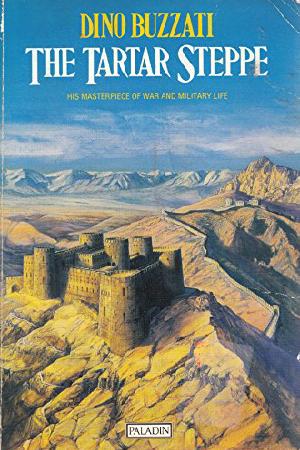The Tartar Steppe by Dino Buzzati

The story follows the life of the young Lt. Giovanni Drogo, who eager to build a successful military career is transferred to Fort Bastiani, an isolated and remote stronghold that overlooks an empty and barren desert. The young Drogo is initially reluctant to serve at the fort and agrees to a temporary assignment, expecting to leave within months. Nevertheless, once he’s persuaded to stay to build his career, months become years, and these into decades as Drogo postpones his leave held by an elusive promise of glory in the battle against the barbarian horde rumored to come from the wasteland. Always watching and waiting, the now beholder of the desert, Giovanni Drogo, spends his days bound by routine and hope, as the life as he once knew has declined under the weight of the army hierarchy, monotony and camaraderie.
Buzzati’s work resembles Kafkaesque elements with its themes of endless waiting and the feeling of the unattainable through interminable postponements. But unlike Kafka, whose characters seem to be swallowed by bureaucracy, Buzzati poses a scenario where the waiting is the sense of the life itself once Drogo has been stripped of his familiarity with the world outside the fortress.
Everything goes by—men, the seasons, the clouds, and there is no use clinging to the stones, no use fighting it out on some rock in mid-stream; the tired fingers open, the arms fall back inertly and you are still dragged into the river, the river which seems to flow so slowly yet never stops
The book explores time as a recurring theme, serving Drogo’s life as an example of the fleetingness of time waiting for the meaning of existence. The author emphasizes the unidirectional flow of time, exposing the postponements of present to the detriment of the future. Thus, despite the feeling of stagnation and routine conveyed in the arid fortress, the narrative reminds us time is constantly shaping it all with its relentless and unceasing march.
The good things lay further back—far, far back and he has passed them by without knowing it
There is also a sense of nostalgia for the unrecoverable days that have gone by, even though in this case it has a lesser preponderance than the longing for a tomorrow full of hopes. In this aspect, we cannot forget the stubborn Lt. Pietro Angustina and his enigmatic “tomorrow we should…”, raised by Buzzati maybe as a challenge to our inventiveness while leaving the doors open wide to suppositions: what should we do? - “perhaps it was something trite and stupid, perhaps an absurd hope, perhaps nothing at all”. Angustina’s words resonate as an expression of resignation and self-delusion in the face of surrender to time.
The Tartar Steppe is an exploration of the desire to find a greater purpose that justifies existence so that we can bypass the abyss of nothingness that lies beneath existence itself and threatens to devour us beneath the weight of our own mortality.
The Fort Bastiani and the desert are not just mere scenarios, but symbols used brilliantly by the author, they are therefore, metaphorical representations: the fortress is an avatar of our institutions and routines that intensify the sense of the lack of purpose; the desert is the existential emptiness and the indifference of the universe and its vastness; and finally, the Tartars are symbols of illusory expectations and goals that people impose on themselves to give some meaning to their lives.
In the context mentioned above, hope acts as distraction that surfs the wave of indifference, withdrawing the characters from their own finitude and preventing them from facing the reality of a wasted life through the expectations of greatness (an invasion, a military glory), serving as a vehicle to escape from the discomforts of existence.
Ultimately, The Tartar Stepper is an allegory to the universal human condition; Drogo’s life mirrors our own aspirations and hopes. It reminds us that in the pursuit of a purpose in this universe indifferent to us, we may end up unfulfilled, while the ticks of time won’t be skipped eroding our lives. Just like Commander Ortiz, Angustina, Drogo and the others, we are not able to leave our personal fortress anymore. Many of us, like them, have persisted in waiting, however time will always be faster than us and we cannot start over again: life rushes by and time waits for no one.